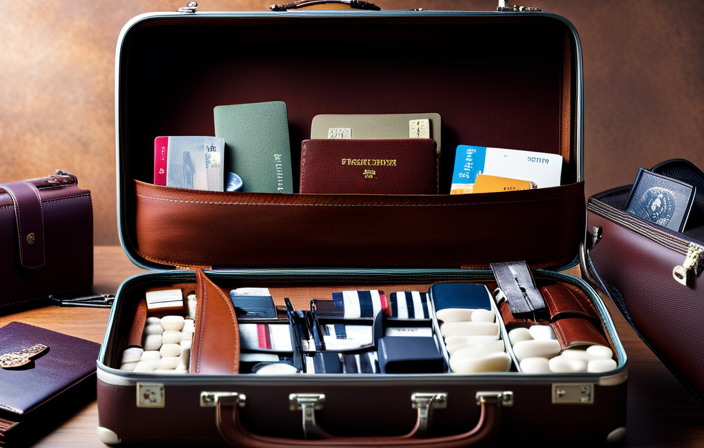Hey there, everyone! Are you daydreaming about whisking away to the tropical haven that is Jamaica? Well, hold onto your sunhats tightly, because things have just gotten a tad more complex.
Jamaica recently implemented stricter COVID-19 travel measures in response to a surge in cases. Now, all visitors over 12 years old must present a negative test within 3 days of travel. It doesn’t matter where you’re from; this rule applies to everyone.
So, grab your test results and buckle up as we dive into the details of Jamaica’s new travel restrictions.
Key Takeaways
- All visitors over 12 years old must present a negative COVID-19 test within 3 days of travel.
- Jamaica has been designated as a Level 4: Very High Level of COVID-19 by the United States CDC.
- The new travel restrictions were implemented on March 10, 2021, due to a spike in cases and concerns about new variants of the virus.
- The stricter measures have had a significant impact on Jamaica’s tourism industry, leading to a decline in revenue and affecting the livelihoods of many people.
Updated COVID-19 Testing Requirements for Travelers
I need to make sure I have a negative COVID-19 test within 3 days of travel if I’m planning to visit Jamaica.
The impact on tourism in Jamaica has led to the implementation of stricter measures due to a spike in COVID-19 cases. Since February 2021, there has been a significant increase in cases, with over 23,000 recorded and more than 400 deaths.
In response to this surge, Jamaica has updated its testing requirements for travelers. All visitors over 12 years old, regardless of nationality, must present a negative test to check in for a flight. This new protocol aims to ensure the safety of both tourists and residents.
It is important for travelers to adhere to these guidelines to help control the spread of the virus and protect the well-being of everyone involved.
Effective Date of the New Travel Restrictions
Starting March 10, 2021, the new travel restrictions go into effect. These measures have a significant impact on the travel industry and are implemented due to concerns about new variants of COVID-19.
The restrictions aim to control the spread of the virus and protect public health. Jamaica, being a popular tourist destination, has seen a spike in COVID-19 cases since February 2021, with over 23,000 cases and more than 400 deaths recorded.
These alarming numbers have prompted the government to implement stricter measures, including the requirement of a negative COVID-19 test within 3 days of travel for all visitors. The United States CDC has also designated Jamaica as a Level 4: Very High Level of COVID-19, advising Americans to avoid travel to the country.
These new restrictions, although necessary for public safety, pose challenges for the travel industry, as they may result in decreased tourism and economic impacts.
Accepted Types of COVID-19 Tests in Jamaica
The accepted types of COVID-19 tests in Jamaica include PCR, Antigen, RNA, and NAA tests. These tests are crucial for detecting the presence of the virus and ensuring the safety of travelers.
To make it easier for the audience to understand, here is a bulleted list of the key points:
-
PCR test: This is a widely used test that detects the genetic material of the virus. It is considered highly accurate and reliable.
-
Antigen test: This test detects specific proteins on the surface of the virus. It provides quicker results but may be less sensitive than PCR tests.
-
RNA test: This test detects the viral RNA and is commonly used to diagnose COVID-19. It is highly accurate and reliable.
Travelers in Jamaica can find these tests at accredited testing centers, which are either certified by the College of American Pathologists (CAP) or registered by the Clinical Laboratory Improvement Amendments (CLIA). These testing centers play a vital role in ensuring that travelers can access the necessary testing before their journey and help mitigate the spread of the virus.
Accreditation Criteria for Testing Centers
To ensure the accuracy and reliability of COVID-19 tests, accredited testing centers in Jamaica must meet the criteria set by CAP or CLIA. These accreditation processes and testing center requirements are crucial in maintaining the quality and integrity of COVID-19 testing. The table below outlines the specific criteria that testing centers must fulfill:
| Criteria | CAP Accreditation | CLIA Registration |
|---|---|---|
| Quality management system | ✓ | ✓ |
| Proficiency testing participation | ✓ | ✓ |
| Documented standard operating procedures | ✓ | ✓ |
| Regular inspections and on-site assessments | ✓ | – |
CDC Guidelines for Traveling to Jamaica
As an American traveler, I must be aware of the CDC guidelines when considering a trip to Jamaica. The CDC has placed Jamaica at a Level 4: Very High Level of COVID-19 and advises Americans to avoid travel to the country.
Jamaica has implemented travel restrictions to combat the spike in COVID-19 cases since February 2021. Visitors must present a negative COVID-19 test within 3 days of travel and complete a Travel Authorization document before check-in and boarding. All visitors over 12 years old, regardless of nationality, need a negative test to check in for a flight. These new restrictions took effect on March 10, 2021.
It is important to note that international travelers must have a negative COVID-19 test before boarding return flights to the US.
Mandatory Travel Authorization Process
When planning my trip to Jamaica, it’s important for me to complete the mandatory Travel Authorization document before check-in and boarding. This document is a requirement for all travelers and must be obtained before boarding the flight.
To ensure a smooth travel experience, I need to be aware of the following requirements:
-
Negative COVID-19 test: I must present a negative COVID-19 test taken within 3 days of travel. This applies to all visitors over the age of 12, regardless of nationality.
-
Accepted test types: Jamaica currently accepts PCR, Antigen, RNA, and NAA tests. It is crucial to ensure that the testing center where I get tested is accredited by CAP or registered by CLIA.
-
Effective date: These new travel restrictions took effect on March 10, 2021, in response to a spike in COVID-19 cases in Jamaica.
Reasons Behind the Stricter Measures in Jamaica
In response to the recent surge in cases, the authorities have introduced new protocols to ensure the safety of visitors and residents alike. These stricter measures are aimed at curbing the spread of COVID-19 in Jamaica.
The impact on the economy has been significant, as the tourism industry, a major source of revenue for the country, has been greatly affected. With over 4 million visitors annually, Jamaica relies heavily on tourism.
However, the implementation of these public health measures is crucial to protect the population from the virus. The spike in cases since February 2021 has prompted the government to take action, with over 23,000 cases and more than 400 deaths recorded.
These stricter measures, such as mandatory testing and the completion of a Travel Authorization document, are necessary to control the situation and ensure the safety of everyone involved.
Impact on Jamaica’s Tourism Industry
The spike in cases has significantly affected the tourism industry in Jamaica, causing a decline in revenue and impacting the livelihoods of many people. The implementation of stricter COVID-19 travel measures has resulted in a decrease in the number of tourists visiting the country. With travel restrictions and advisories in place, many potential visitors have chosen to cancel or postpone their trips to Jamaica.
This has had a direct impact on tourism-related businesses such as hotels, restaurants, and tour operators, who are experiencing a significant decrease in bookings and revenue. The economic consequences of this decline in tourism are far-reaching, as many individuals and communities rely heavily on the industry for their livelihoods.
The government and tourism stakeholders are working to mitigate the impact by implementing safety protocols and promoting domestic tourism, but the road to recovery remains challenging.
Frequently Asked Questions
How Many COVID-19 Cases Has Jamaica Recorded Since the Start of the Pandemic?
Since the start of the pandemic, Jamaica has recorded over 23,000 COVID-19 cases. This has had a significant impact on the tourism industry, as the country attracts millions of visitors annually.
Are There Any Exceptions to the Negative COVID-19 Test Requirement for Travelers to Jamaica?
Yes, there are exceptions to the negative COVID-19 test requirement for travelers to Jamaica. However, it is important to note that the specific details and criteria for these exceptions have not been provided in the given context.
How Long Will the Stricter COVID-19 Travel Measures Be in Effect?
The duration of the stricter COVID-19 travel measures in Jamaica is unclear, but they aim to curb the spike in cases. These measures will likely have a significant impact on the tourism industry.
Are There Any Specific Requirements for the Travel Authorization Document?
Yes, there are specific requirements for the travel authorization document. It is mandatory and must be obtained before boarding the flight. More information on the requirements can be found on the official Jamaica travel website.
How Has the Spike in COVID-19 Cases Affected Jamaica’s Healthcare System?
The spike in COVID-19 cases has put a tremendous strain on Jamaica’s healthcare system, with limited resources to handle the surge. The increase in cases has overwhelmed hospitals, leading to shortages of beds and medical staff.










